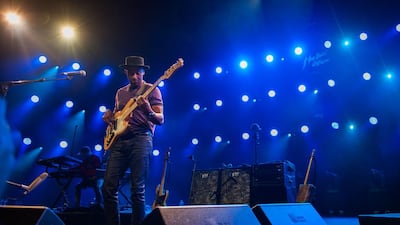Ask pop-music fans who Marcus Miller is, and they are likely to be stumped. Mentioned the songs he played on, however, and their eyes will light up in recognition.
The American jazz musician remains one of the most in-demand bassists in the business – you need a lot of credibility to get the 57-year-old to appear on your record.
His swooning riffs were prominent in Mariah Carey's 1990 hit Vision of Love.
His contribution to Where You Are, from Whitney Houston's 1987 debut album Whitney, was even more delicate.
Miller's work reached a new generation in 1996 when rapper Jay Z collaborated with Mary J Blige on Can't Knock the Hustle, which sampled Miller's riffs from his solo track Much Too Much.
Then there are all the jazz legends he has performed with, including a 10-year stint from 1980 to 1990 recording with Miles Davis.
Speaking at the recent Mawazine Festival in Morocco, Miller says those heady years were one big rush. “It was basically whoever needed bass, they would call me up,” he says.
“I just ran to the studio, read the music and played it. There was Mariah Carey, Whitney Houston, Aretha Franklin, Miles Davis – it didn’t matter who it was. After it was done, I packed up my bass and ran to the next studio and did the same thing.”
As a testament to his work ethic, Miller also managed to build a prolific career as a solo artist.
He has released more than a dozen solo albums over three decades – but it is only in the past 10 years or so that he has managed to emerge from the studio and engage in world tours. They were full of insights, he says.
“When I was in the studio, I didn’t know who would listen to the music,” he says. “It would just go out there in the world and I wouldn’t know where it goes.”
“But now in the past 10 years, I travel around and play shows. I see people, we take pictures together and they tell me what my music means to them. That just changed my life.
“For someone to say: ‘Here is my son, I named him Marcus because your music is so important to me,’ that makes you humble and take your music more seriously.”
His latest album is a case in point. The Grammy Award-winning Afrodeezia is akin to a music travelogue of Miller's journey into understanding the African slave trade.
As a spokesman for Unesco’s Slave Route Project, Miller travelled to several countries including Senegal (visiting the haunting House of Slaves on Gorée Island), Morocco, the Caribbean, Paris and New Orelans. It was a life-changing experience, Miller explains.
“Art, and music in particular, speaks to emotions that are basic to all of us in a very clear way, without the problem that we have when we begin to use words,” he says. “Words are our greatest inventions, of course, but they do have limitations.
“If we speak different languages, then it would be difficult to discuss the specifics of what we feel. But if I play a certain phrase on an instrument, you can understand what I am saying. You can say things with music that is very difficult to express with words.”
What is striking about Afroodeezia, is that it doesn't sound morbid. Peppered with eclectic guest stars, including political rapper Chuck D from Public Enemy, popular jazz pianist Robert Glasper and sultry vocalist Lalah Hathaway, the album is a gumbo of styles ranging from the propulsive sounds of Ghanian HighLife (in the opener Hylife) to the hypnotic blues of the Moroccan music form Gnawa in the track B's River.
The latter finds Miller adeptly playing the genre’s signature instrument, the three-stringed lute called the gimbri.
Afrodeezia is unapologetic in its mission to entertain.
“It is a celebration that African Americans have made it through that journey of slavery and made it through the other side with dignity and humanity,” Miller says.
“It’s hard, because every time you mention slavery, everything gets dark. I wanted it to be a celebration of resilience and, just as importantly, show that music was a salvation in a lot of ways.”
With shows and festival appearances booked until the end of the year, Miller is confident the road will hold more inspiration.
The key, he states, is to focus on the little things.
“You always see artists talking about the sunrises and all that– but there other things, too,” he adds.
“I can get inspired by people’s voices. Arguments have their own sounds. I always keep notes of what I hear and the feelings I get.
“The important thing is to keep your eyes open, because inspiration is everywhere. You can see wonderful things.
“The job of an artist is to then express it in the best way you can.”
• Next week on the Mawazine sessions, the French soul singer Imany
sasaeed@thenational.ae


